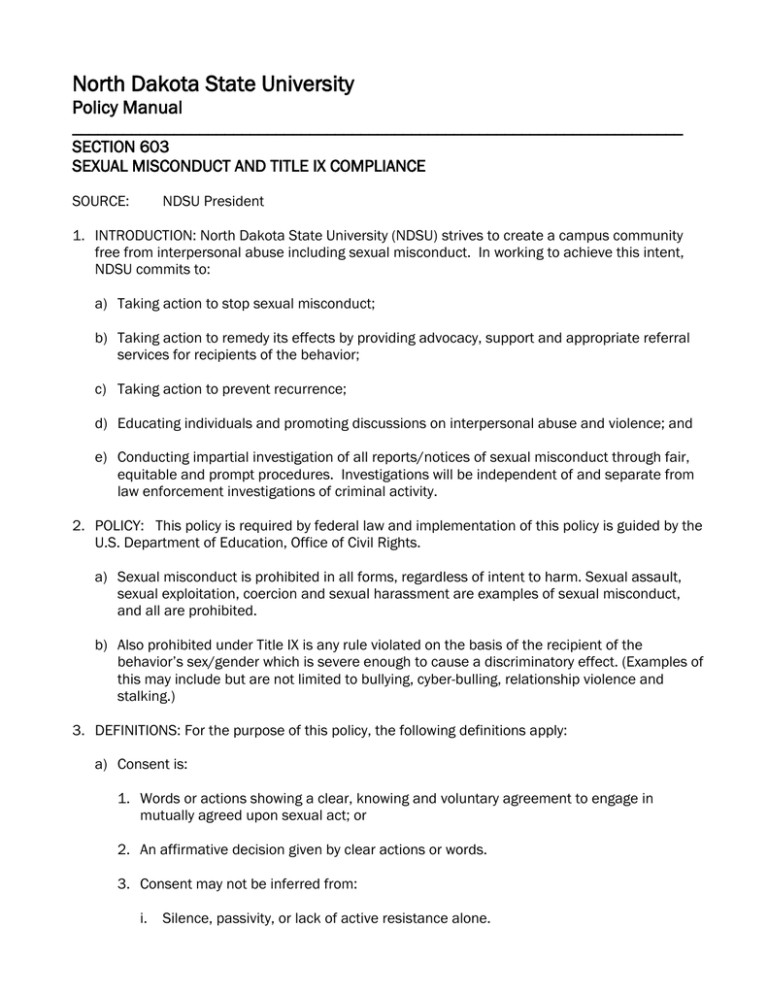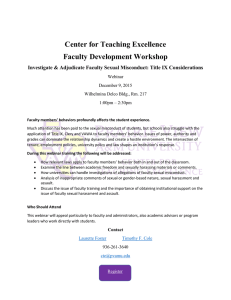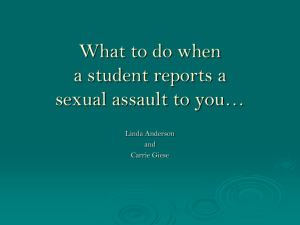
North Dakota State University
Policy Manual
________________________________________________________________________
SECTION 603
SEXUAL MISCONDUCT AND TITLE IX COMPLIANCE
SOURCE:
NDSU President
1. INTRODUCTION: North Dakota State University (NDSU) strives to create a campus community
free from interpersonal abuse including sexual misconduct. In working to achieve this intent,
NDSU commits to:
a) Taking action to stop sexual misconduct;
b) Taking action to remedy its effects by providing advocacy, support and appropriate referral
services for recipients of the behavior;
c) Taking action to prevent recurrence;
d) Educating individuals and promoting discussions on interpersonal abuse and violence; and
e) Conducting impartial investigation of all reports/notices of sexual misconduct through fair,
equitable and prompt procedures. Investigations will be independent of and separate from
law enforcement investigations of criminal activity.
2. POLICY: This policy is required by federal law and implementation of this policy is guided by the
U.S. Department of Education, Office of Civil Rights.
a) Sexual misconduct is prohibited in all forms, regardless of intent to harm. Sexual assault,
sexual exploitation, coercion and sexual harassment are examples of sexual misconduct,
and all are prohibited.
b) Also prohibited under Title IX is any rule violated on the basis of the recipient of the
behavior’s sex/gender which is severe enough to cause a discriminatory effect. (Examples of
this may include but are not limited to bullying, cyber-bulling, relationship violence and
stalking.)
3. DEFINITIONS: For the purpose of this policy, the following definitions apply:
a) Consent is:
1. Words or actions showing a clear, knowing and voluntary agreement to engage in
mutually agreed upon sexual act; or
2. An affirmative decision given by clear actions or words.
3. Consent may not be inferred from:
i.
Silence, passivity, or lack of active resistance alone.
ii. A current or previous dating or sexual relationship.
NOTE: It is important to obtain explicit consent from any sexual partner and not to make
assumptions. If confusion or ambiguity on the issue of consent arises anytime during
the sexual interaction, it is essential that each participant stops and clarifies,
verbally, willingness to continue. Consent to one form of sexual act does not imply
consent to other forms of sexual act(s).
b) Coercion is unreasonable pressure for sexual activity. Coercive behavior differs from
seductive behavior based on the type of pressure someone uses to get consent from
another. When someone makes clear to you that they do not want sex, that they want to
stop, or that they do not want to go past a certain point of sexual interaction, continued
pressure beyond that point can be coercive.
c) Incapacitation is a state where someone cannot make rational, reasonable decisions
because they lack the capacity to give knowing consent (e.g., to understand the “who, what,
when, where, why or how” of their sexual interaction).
d) Intimidation is implied threats or acts that cause an unreasonable fear of harm in another.
e) Responsible employees:
1. Those with authority to address and remedy sex and gender-based discrimination and
harassment;
2. Those with responsibility to report sexual misconduct to a supervisor; and/or
3. Those who a student would reasonably believe have such authority or obligation.
f) Retaliation: Any adverse action taken against a person because of their participation in a
protected activity. Retaliation against an individual for alleging sexual misconduct,
supporting a complainant or for assisting in providing information relevant to a claim of
sexual misconduct will be treated as another possible instance of harassment or
discrimination. Any acts of alleged retaliation should be reported immediately to the Title IX
Coordinator or a Deputy Title IX Coordinator and will be promptly investigated. NDSU is
prepared to take appropriate steps to protect individuals who fear that they may have been
subjected to retaliation.
g) Sexual Acts include, but are not limited to the following actions:
1. Sexual intercourse;
2. Sodomy (oral and/or anal);
3. Sexual penetration with any object;
4. Sexual touching of a person’s intimate parts (genitalia, groin, breasts, buttocks, mouth or
other bodily orifice or the clothing covering them); or
5. Compelling a person to touch his or her own or another person’s intimate parts.
h) Sexual Assault: Any sexual act between two or more people to which one person does not or
cannot consent. This includes sexual acts or contacts with others that can involve:
1. Compelling a person to submit to sexual acts or contacts by force, threat of force, or
intimidation;
2. Use of intoxicants to substantially impair the person’s power to give consent;
3. Engaging in such acts when the person suffers from a mental state that renders him or
her incapable of understanding the nature of the contact. This includes, but is not limited
to, situations when an individual is intoxicated, “high”, scared, physically or
psychologically pressured or forced, passed out, unconscious, intimidated, coerced,
mentally or physically impaired, beaten, isolated, or confined; or
4. A victim under fifteen (15) years of age. (Do note the age of consent may vary depending
on the ages of the individuals involved in the act. For more information see: a link to the
Sexual Assault Prevention Programs location with this information will be provided here.)
i) Sexual Exploitation: Taking sexual advantage of another person without consent. Examples
include, but are not limited to:
1. Causing the incapacitation of another in order to take sexual advantage of the person;
2. Distributing or publishing sexual information;
3. Engaging in indecent exposure;
4. Engaging in voyeurism (the viewing of another for sexual gratification);
5. Invasion of sexual privacy;
6. Knowingly exposing another to an STD or HIV;
7. Prostituting another person; or
8. Recording, photographing, or relaying sexual sounds or images.
j) Sexual Harassment: Unwelcome sexual advances, requests for sexual favors, and other
verbal or physical conduct of a sexual nature constitute sexual harassment when:
1. Submission to such conduct is made either explicitly or implicitly a term or condition of
an individual’s employment or academic achievement;
2. Submission to or rejection of such conduct by an individual is used as the basis for
employment decisions or academic decisions affecting such individual; or
3. Such conduct has the effect of unreasonably interfering with an individual’s work or
academic performance or creating an intimidating, hostile, or offensive environment.
k) Sexual Misconduct: Any non-consensual behavior of a sexual nature that is committed by
force, intimidation, or is otherwise unwelcome that is sufficiently severe, persistent, or
pervasive so as to limit a student’s ability to participate in or benefit from an NDSU program
or activity. Depending on the circumstances, a single incident of sexual misconduct may be
sufficient to limit a student’s ability to participate in or benefit from an NDSU program or
activity.
4. REPORTING/CONFIDENTIALITY: Students are encouraged to report incidents or information
related to sexual misconduct as soon as possible. If criminal activity is involved, students are
encouraged to contact NDSU Police or your local law enforcement. NDSU employees who
became aware of a complaint or violation of this policy and have the authority to take action on
the complaint or violation, shall report the complaint or violation either to the Title IX
Coordinator or a Deputy Title IX Coordinator:
Canan Bilen-Green, Vice Provost for Faculty and Equity/Title IX Coordinator
Old Main 201
Phone: 701-231-7040; email: canan.bilen.green@ndsu.edu
Janna Stoskopf, Dean of Student Life/Deputy Title IX Coordinator
Memorial Union 250
Phone: 701-231-8240; email: janna.stoskopf@ndsu.edu
Colleen Heimstead, Associate Athletics Director for Compliance/Deputy Title IX Coordinator
Bison Sports Arena 102W
Phone: 701-231-5696; email: colleen.heimstead@ndsu.edu
The guiding principle in accepting reports or sexual misconduct is to avoid re-victimizing the
recipient of the behavior by forcing them into any plan of action. NDSU will make every attempt
to safeguard the privacy of the complainant and/or recipient of the behavior; however, it is
important that complainants recognize that NDSU cannot ensure confidentiality in all cases.
NDSU must weigh the request for confidentiality against its obligation to protect the safety and
security of the entire campus. Depending on the circumstances of the offense (the severity of
the offense, the number of victims involved, etc.), NDSU may be required to respond to an
incident, even if confidentiality has been requested. Therefore, NDSU employees cannot
guarantee absolute confidentiality. Individuals desiring confidentiality should be encouraged to
contact one of the following:
F-M Rape & Abuse Crisis Center: 701-293-7273 (Available 24 hours) www.raccfm.com
NDSU Counseling Center: 701-231-7671 (Available 24 hours)
http://www.ndsu.edu/counseling/
5. FORMAL/INFORMAL RESOLUTION: NDSU offers both formal and informal resolution of sexual
misconduct complaints involving NDSU students, faculty or staff. Regardless of the path chosen
by the recipient of the behavior, NDSU will conduct an impartial, fair, and prompt investigation
into the allegations, and ensure that actions will be taken to prevent similar actions in the
future. Typically, investigation/resolution of the complaint will occur within 60 days. The sexual
orientation and/or gender identity of individuals engaging in sexual activity is not relevant to
allegations under this policy. Investigation/resolution of the allegations shall include:
a) The complainant and the accused having equal opportunities to present relevant witnesses
and other evidence;
b) Providing both sides with similar and timely access to any information that will be used
during the process;
c) Equal opportunity to have a support person present, and equal restrictions on how a support
person may participate during the process;
d) The right of the complainant and the accused to be informed of the outcome of the
investigation/resolution, and the right of either party to appeal; and
e) The right of the complainant and the accused to receive periodic status updates throughout
the investigation/resolution process.
6. FORMAL RESOLUTION: Formal resolution of sexual misconduct complaints will be resolved as
follows:
a) If the alleged perpetrator is a student, the University will follow the procedure outlined in
NDSU Rights and Responsibilities of Community: A Code of Student Behavior.
b) If the alleged perpetrator is an NDSU employee, the University will follow the applicable
policy for the circumstances (e.g. Policy 156: Equal Opportunity Grievance Procedures, Policy
162: Sexual Harassment).
c) All sexual misconduct cases shall use a “preponderance of the evidence” standard; meaning
that in order for the accused to be held responsible, the hearing officer must determine that
it is more likely than not that the sexual misconduct occurred.
7. INFORMAL RESOLUTION: Except in cases of sexual assault which always require a formal
resolution, complainants may choose to pursue informal resolution of their complaint. Informal
resolution is entirely voluntary and the complainant may end informal resolution at any time.
Complainants should never attempt to resolve the complaint directly with the accused. In cases
of informal resolution, the Title IX Coordinator shall assign a school official with the authority to
remedy the alleged violation (e.g. Dean of Student Life, the alleged perpetrator’s supervisor,
etc.) to oversee the informal resolution process. Informal resolution provides the complainant
with a forum to confront the accused; to express how the alleged behavior has impacted them
and those close to them; and to communicate to the accused and the University how this
behavior needs to be addressed so that they, or anyone else at the University, are not victimized
again by the behavior.
a) In cases where the accused acknowledges their involvement in the sexual misconduct, the
school official shall impose an appropriate sanction for the misconduct. If the sanction is
agreeable to the parties, the informal resolution is complete, and the sanction is imposed.
No appeal is allowed.
b) In cases where the accused does not acknowledge responsibility, the school official may
impose a sanction warranted by the information gathered during the informal resolution,
and any supporting information known to the University. The sanction may be appealed
either to the Title IX Coordinator or to the Dean of Student Life/Deputy Title IX Coordinator,
who shall have the final decision on the appropriate sanction.
8.
ANONYMOUS COMPLAINTS: Anonymous complaints will be accepted by the University.
The University’s ability to investigate and resolve anonymous complaints will be limited if the
information contained in the anonymous complaint cannot be verified by independent facts.
Anonymous complaints may be filed by any of the following means:
a) Bias Report Form: https://www.ndsu.edu/biasreport/
b) Dean of Student Life Anonymous Report Form
https://www.ndsu.edu/student_life/departments_and_programs/sexual_assault_prevention/re
port_a_sexual_assault/file_an_anonymous_report/
c) Sexual Assault Resources and Advocacy (SARA):
http://www.ndsu.edu/student_life/departments_and_programs/sexual_assault_prevention/get
_help_now/
9. INTERIM MEASURES: When warranted by the circumstances surrounding a complaint of sexual
misconduct, the University may implement interim measures until its investigation concludes.
Violation of these interim measures may be considered grounds for additional complaints of
sexual misconduct or as retaliation for the ongoing investigation of sexual misconduct. Potential
interim remedies include, but are not limited to:
a) Providing an escort to the complainant so that he/she may move safely on campus;
b) Issuing a no contact order to the parties, prohibiting any contact between them;
c) Moving the complainant and/or accused to different University housing;
d) Altering the class schedule of the parties so that they do not attend the same classes;
e) Providing counseling services; and
f) Providing academic support services.
10. PREVENTION: NDSU considers both physical surroundings and educational programming in
addressing prevention of sexual misconduct. The University continually reviews and modifies
the physical surroundings to foster security and safety, including but not limited to such factors
as emergency phones, lighting, and locking procedures. For further safety information, contact
the NDSU University Police and Safety Office: 701-231-8998 (NDSU University Police) or 701231-7759 (Safety Office). NDSU offers curricular and co-curricular educational experiences
concerning bystander intervention, primary prevention efforts, personal safety, sexual assault,
and sexual misconduct. For further information on pertinent campus educational opportunities,
contact the NDSU Dean of Student Life Office at 701-231-6560.
http://www.ndsu.edu/student_life/
11. INTERVENTION: The NDSU community actively supports individuals who experience sexual
misconduct through a coordinated response system that attends to their physical and emotional
well-being. NDSU disciplinary efforts respect the personal rights of all parties. For further
information, see NDSU Rights and Responsibilities of Community: A Code of Student Behavior
and NDSU Calendar Handbook distributed by Residence Life. All reports/notices of sexual
assault and sexual misconduct are handled in a manner designed to respect the privacy of the
involved individuals, to the extent permitted by law. Incidents are reported to appropriate
Departments and agencies in consideration of safety concerns and investigative needs. In
addition, NDSU publishes and disseminates annual statistics on incidents of sexual assault in
the annual Personal Safety and Security publication (available in printed and online form).
http://www.ndsu.edu/police_safety/police/annualsecurityreport/
12. FALSE COMPLAINTS: Knowingly submitting a false report of sexual misconduct is prohibited.
Anyone submitting a false report is subject to disciplinary action.
13. FOR MORE INFORMATION on sexual assault and sexual assault prevention programs, please
contact the NDSU sexual assault advocate at ndsu.sa-advocate@ndsu.edu.
________________________________________________________________________________________
HISTORY:
New
Amended
Amended
Amended
Amended
Housekeeping
Housekeeping
Housekeeping
September 1995
October 2007
January 2008
June 3, 2011
September 12, 2013
September 17, 2013
July 23, 2014
April 8, 2016



